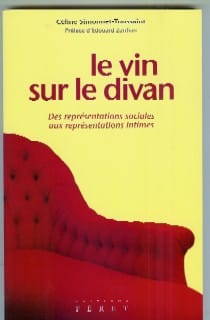A great lover of wine and women… but also of a few young cupbearers, the Iranian poet Omar Khayam (11th-12th century) celebrated the love of life in his famous Rubaiyat (four-line stanzas) while questioning his guests: “If you refuse wine, what then do you have to hide?”. He had certainly grasped, just like the radical Muslims who pursued him until his death, the connections as subtle as they were dangerous between the products of the vine and those of the unconscious.
Today, these representations are made accessible to us by a psychologist, Céline Simonnet-Toussaint, through a series of surveys coupled with interviews conducted among youth about their relationships with alcohol. Not without a certain audacity, since after all, nobody asked her, she places “wine on the couch” outright. She operates with the benevolent complicity of Féret Publishing, with a prestigious title as exists in Bordeaux, “publisher of wine since 1812.” Wine, the author tells us, “partially tells the story and the position of the individual within the family.” The unconscious history, of course, that which is only uncovered fragment by fragment, through offspring but also in fits and starts like an accident in the genesis and development of an individual.
The doctoral student is obviously interested in the rite of passage to adulthood constituted by the discovery of wine initiated by an elder. She evokes, in an even more symbolic way, a pivotal moment between childhood and adulthood: one that admits, if not invites, the offspring to leave the table of the little ones and join that of the “adults” in order to discover what until then was a forbidden perimeter. Forbidden all the more pleasurable because it was sometimes surreptitiously transgressed at the end of family feasts by emptying the remains of glasses spared by the adults. But the work also has the merit of updating the “thinking,” “talking,” and “living” of wine. A true consecration of inter-generational transmission that builds the individual, reveals their conflicts, and helps them to identify their desire. Psychoanalysis and goblet meet for a brief moment: In vino veritas! Thus, it is the structuring power – real or supposed – of the family bond around the possession or exploitation of the vineyard. Furthermore, according to the author, wine contributes to the process of “sexuation”: either during its tasting “among men” in the father’s cellar, or, for the daughter, in her learning of the feminine by sharing culinary secrets near the stoves with her mother. Associated with meals where the places of the guests betray elective affinities, the consumption of wine helps the latter to “narrate itself” and to affirm, as Céline Simonnet-Toussaint rightly points out, “an identity resistance in the face of certain globalized food trends.”
And then, there is the experience of pleasure, so constitutive of the unique and personal character of the human being. Repeated pleasure of taste, the only one of the five senses that “consumes its object” and consecrates the primacy – and its omnipotence since one returns to it at the end of one’s life – of the fantasy of orality. By the way, and as if to fend off criticism in these times of all-out crusades against the benefits of earthly pleasures, the psychologist tries to reassure us with this assertion: the regions of France where alcoholism wreaks havoc are mainly those where vines do not grow. The elegance of culture creates a barrier to vulgarity and encourages respect for the product. The noble rot of Botrytis cinerea, necessary for the production of Château Yquem Sauternes, illustrates this perfectly. Likewise, this personal memory of the author of these lines, probably owing to current events. This took place in the early eighties during international university meetings organized by the late Robert Lange, then President of the “Friends of the French Republic.” Hosted in the cellars of Baron de Lur Saluces at Yquem, two of my great friends, a Shiite from Haret Hreik in the southern suburbs of Beirut and a young Israeli professor of dietetics at Tel Aviv University – and incidentally a reserve lieutenant in the IDF, fraternized over the discovery and tasting of the precious beverage. Likely a daydream…


